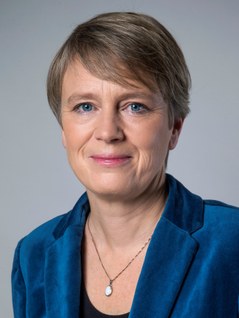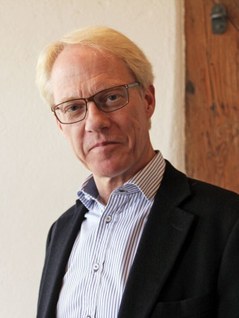New PIAAC study coming up – to measure abilities among adults
The knowledge gap between high and low skilled workers widens over the course of a working life. One way of bridging the gap is securing more knowledge about where the strength and weaknesses lie in lifelong learning. This is the reason for the second round of the OECD’s PIAAC study, which looks at literacy, numeracy and problem solving skills in adults.
“The big differences between adults’ skills are found within countries, not between countries,” said State Secretary Irene Wennemo, when she opened the conference ”Nordic PIAAC Expert Seminar” in Stockholm on 21 November.
The seminar, hosted by the Swedish Ministry of Employment and Integration, was held in the run-up to the second round of the OECD’s large PIAAC survey, which looks at adults’ knowledge and problem solving skills. PIAAC is short for “Programme for the International Assessment of Adult Competencies” and is often referred to as a PISA study for adults.
The study, first presented in 2013, is the largest such survey of adults’ skills ever carried out, and is based on interviews with a total of 166,000 people in 23 OECD countries. A Nordic network of researchers was established parallell to the start of the first round of PIAAC. They have been able to add different data registers and create a more comprehensive image of what influences adults’ skills and learning. 2015 saw the publication of an analysis of the Nordic PIAAC results, which compared adult skills in Denmark, Finland, Norway, Sweden and Estonia. Some 70 experts from these countries attended the Swedish experts’ meeting.
A tool in the service of democracy
The meeting also marked the end of a series of conferences dealing with what skills will be needed in a more digitalised working life, held during the Swedish Presidency. What skill will be more important when the labour market changes, and who will be responsible for securing workers acquire the necessary skills to face the changes?
 “PIAAC shows which skills that are needed, but it also highlights the fact that highly educated people manage changes to working life better than people with lower levels of education,” said Irene Wennemo.
“PIAAC shows which skills that are needed, but it also highlights the fact that highly educated people manage changes to working life better than people with lower levels of education,” said Irene Wennemo.
“PIAAC is important because it contains a lot of data, which allows us to compare ourselves to other countries, and find out what our strengths and weaknesses are. Reducing differences between people is what defines democracy, and PIAAC is an important tool in this,” said State Secretary Erik Nilsson.
He also pointed to the large flow of refugees in 2015 which challenges education systems, both for adults school-age children. There was a big mix in the level of education among those who arrived. 30 percent of the newly arrived had approximately the same education as native Swedes, but there are also some who have no education or only a few years of schooling. The question is what they need i order to enter the Swedish labour market, which offers few so-called unqualified jobs.
School results crucial also for adults
It is difficult to predict how the large refugee flow will influence Sweden’s results in the next PIAAC study, due to be published in 2021/2022. Other studies show that if foreign-born children go to Swedish school from year one, they become equal to Swedish-born children when it comes to education. It is more difficult for those who enter the Swedish education system at a later stage. Adult education does not seem to be able to compensate for bad basic education, and to secure a job with only four or five years of basic education is nearly impossible in the Swedish labour market.
 “Research shows that adult education struggles to fix damages from elementary school. If you do badly at 15, you often do badly at 30,” says Erik Mellander, Associate Professor of national economy working at the Uppsala University’s Institute for Evaluation of Labour Market and Education Policy.
“Research shows that adult education struggles to fix damages from elementary school. If you do badly at 15, you often do badly at 30,” says Erik Mellander, Associate Professor of national economy working at the Uppsala University’s Institute for Evaluation of Labour Market and Education Policy.
He was also one of the conference moderators, and has been part of the Nordic network for PIAAC since the start in 2010. He has also participated in other studies looking at adult learning and is worried about the widening gap between people with high and low education – as well as the fact that people with the lowest levels of education get the least adult training.
“They get very little, and this is a serious problem which shows that we still have a long way to go,” he concludes.
Who owns the issue?
Compared to many other countries, Sweden is doing relatively well when it comes to adult literacy, numeracy and problem-solving using computers. But younger people lag behind and drag down the average. Those scoring low also tend to get worse with time. Gaps in knowledge is also increasing between different schools. There are several reasons for this, depending on who you ask.
“Education researchers disagree on this. Pedagogues say young people are lagging behind because of schools and the free choice of school is being returned to the municipalities, while we economists believe it is more complicated than that. School funding hasn’t been falling, but the teaching profession has lost status and this makes recruitment harder,” says Erik Mellander.
There are big variations between different trades and different regions when it comes to skills development in working life. Politicians are aware of this problem, according to Erik Mellander, but they do not have ownership of the issue of workplace skills development beyond the public sector – where there is often more skills development than in the private sector. The care sector, for instance, benefits from more skills development than many other trades.
“The private sector depends on incentives for skills development, for instance through taxation. It must become more profitable for employers to offer life-long learning,” says Erik Mellander.
Nordic countries can learn from each other
He has several proposed changes on his wish list. In the short term it is important to channel training resources for adults to those who need it most. In the medium term he believes it is important to improve results in elementary school.
“This is crucial,” says Erik Mellander.
When it comes to newly arrived people with low education levels, it is important to accept that they have arrived for humanitarian reasons, and to create systems to help them gain a basic education. It is important to provide a lot of Swedish language support for young people who start their basic education halfway through. He would also like to see an improvement in Swedish For Immigrants (SFI), to stop mixing people with university degrees mixed with people who perhaps only have a few years of education.
“I also want to see a good triage system for those who arrive. We can learn a lot from Norway here,” he says, and adds more people should take an interest in finding inspiration from neighbouring countries.
Estonia too is an inspiration. They do not focus that much on education, but gets nearly the same results as Sweden – despite the fact that Sweden has put far more into this, says Erik Mellander.
“This shows there is room to use Sweden’s education resources more efficiently.”
The results from the second PIAAC report will be published in 2023. The main study will be performed during 2021 and 2022.
- 166,000 interviews
-
PIAAC is short for ”Programme for the International Assessment of Adult Competencies” and is an OECD study which measures adult skills. It is the largest study of its kind, based on interviews with 166,000 people aged 16 to 65 across 25 countries. The first study came in 2013, and was followed up two years later with a Nordic PIAAC analysis, which encompassed Denmark, Finland, Norway, Sweden and Estonia.
The IPAAC study assesses adults’ proficiency in literacy, numeracy and problem solving skills with the help of computers. A Nordic network of researchers in this area was established in 2010, and has complemented the PIAAC data with register data, which allows the results to be analysed further. The Nordic analysis showed that a total of around two million people in the participating countries had weak literacy, numeracy and problem-solving skills.
A new PIAAC survey is expected to be published in 2021/2022.
 Follow us on Facebook
Follow us on Facebook
